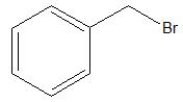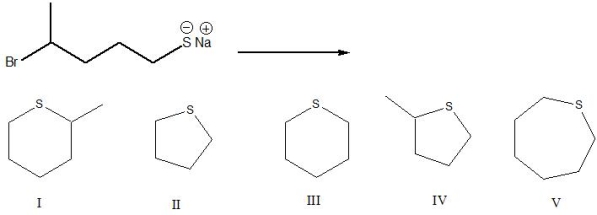Exam 7: Substitution Reactions
Exam 1: A Review of General Chemistry: Electrons, Bonds, and Molecular Properties191 Questions
Exam 2: Molecular Representations154 Questions
Exam 3: Acids and Bases126 Questions
Exam 4: Alkanes and Cycloalkanes114 Questions
Exam 5: Stereoisomerism125 Questions
Exam 6: Chemical Reactivity and Mechanisms110 Questions
Exam 7: Substitution Reactions123 Questions
Exam 8: Alkenes: Structure and Preparation Via Elimination Reactions111 Questions
Exam 9: Addition Reactions of Alkenes148 Questions
Exam 10: Alkynes166 Questions
Exam 11: Radical Reactions90 Questions
Exam 12: Synthesis95 Questions
Exam 13: Alcohols and Phenols119 Questions
Exam 14: Ethers and Epoxides; Thiols and Sulfides130 Questions
Exam 15: Infrared Spectroscopy and Mass Spectrometry129 Questions
Exam 16: Nuclear Magnetic Resonance Spectroscopy114 Questions
Exam 17: Conjugated Pi Systems and Pericyclic Reactions131 Questions
Exam 18: Aromatic Compounds98 Questions
Exam 19: Aromatic Substitution Reactions109 Questions
Exam 20: Aldehydes and Ketones143 Questions
Exam 21: Carboxylic Acids and Their Derivatives117 Questions
Exam 22: Alpha Carbon Chemistry: Enols and Enolates131 Questions
Exam 23: Amines97 Questions
Exam 24: Carbohydrates122 Questions
Exam 25: Amino Acids, Peptides, and Proteins115 Questions
Exam 26: Lipids102 Questions
Exam 27: Synthetic Polymers100 Questions
Select questions type
Which of the following is the rate equation for the following SN2 reaction? 
(Multiple Choice)
4.8/5  (43)
(43)
Consider the following SN2 reaction,  Assuming no other changes, what is the effect on the rate, if the concentration of 1-chloro-3-methylbutane is doubled?
Assuming no other changes, what is the effect on the rate, if the concentration of 1-chloro-3-methylbutane is doubled?
(Multiple Choice)
4.7/5  (27)
(27)
Which of the following is not a possible step in a substitution reaction? 
(Multiple Choice)
4.8/5  (40)
(40)
What substitution reaction mechanism is most likely for the following conversion? 
(Multiple Choice)
4.8/5  (36)
(36)
For the following reaction, label the nucleophile, electrophile, and leaving group. 
(Essay)
4.8/5  (32)
(32)
Which of the following compounds will undergo the fastest SN1 reaction? Explain your choice. 
(Essay)
4.9/5  (47)
(47)
For the following reaction, label the nucleophile, electrophile, and leaving group. 
(Essay)
4.8/5  (39)
(39)
What substitution reaction mechanism is most likely for the following compound? 
(Multiple Choice)
4.8/5  (37)
(37)
What substitution reaction mechanism is most likely for the following compound? 
(Multiple Choice)
4.9/5  (40)
(40)
Predict the product for the following reaction.  A) I
B) II
C) III
D) IV
E) None of these
A) I
B) II
C) III
D) IV
E) None of these
(Essay)
4.9/5  (31)
(31)
Showing 81 - 100 of 123
Filters
- Essay(0)
- Multiple Choice(0)
- Short Answer(0)
- True False(0)
- Matching(0)